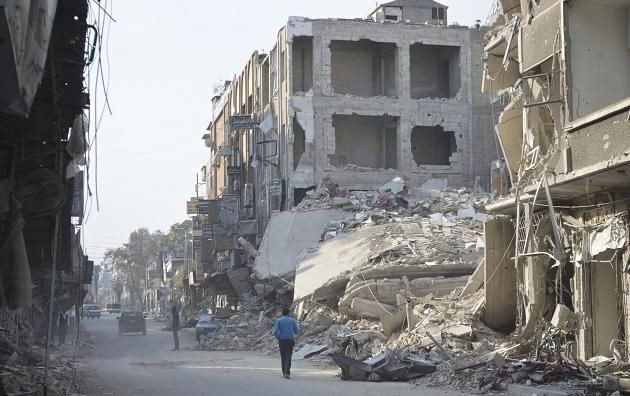The Assad End-Game: Head Of Syrian Military Police Defects

Syrian President Bashar al-Assads' downward spiral descended to a new low on Wednesday morning when the head of Syria's military police announced he was defecting and declared himself a member of the rebellion.
In a short video on YouTube, General Abdel Aziz Jassim al-Shalal said, as translated by the Telegraph, "I have defected because of the deviation of the army from its primary duty of protecting the country and its transformation into gangs of killing and destruction, the destruction of cities and villages, and committing massacres against our unarmed people who went out to demand liberty. Long live Syria, free and strong."
A Syrian security source told Reuters that the defection was insignificant in the grand scheme of things. "Shalal did defect but he was due to retire in a month and he only defected to play the hero."
Be that as it may, a defection at that level, the latest of many during the course of the almost two-year-old Syrian civil war, could further bolster an already emboldened rebel base that has recently seen a string of successful attacks and managed to capture much of the Aleppo province.
"Assad's military position has become increasingly precarious," wrote Jeffrey White, a defense fellow at the Washington Institute. "The rebels have significantly improved their combat capabilities since last winter [to] allow them to reduce the regime's presence throughout the country … Most significant, the rebels are now self-sustaining …They do not need much if any outside armament."
White also said the rebels are losing significantly fewer men per month than the Syrian army: The rebels lose about 850 men for every thousand lost by the army, and the rebels seem to be better at replacing their forces than the army.
The most likely end-game, White wrote, is a "chaotic collapse," with the Syrian army simply breaking down and the rebels rushing in.
U.N. Special Envoy Lakhdar Brahimi was in Damascus on Monday, and he met with Assad in an effort to open a dialogue to a find a resolution. Details of the meeting were not forthcoming, but Brahimi is scheduled to meet with several more Syrian government officials and opposition leaders during the week.
Several Syrian delegations have also flown to Moscow in recent weeks, including Deputy Foreign Minister Faisal Makdad, ostensibly to broker an exit strategy for Assad. The Russians, however, have denied they are interested in helping Assad. Russian Foreign Minister Sergey Lavrov told reporters on Friday that Russia "doesn't invite President Assad here," although if any other countries are "willing to provide him guarantees, they are welcome!"
Russia was one of the Assad regime's staunchest supports, and it took heavy criticism for blocking U.N. Security Council resolutions meant to condemn or take action against the Syrian government.
Assad's imminent collapse seems to be gaining speed every day. The question remains as to whether he will stay in Damascus and fight to the death, or attempt to flee to Latakia, a coastal area where much of Assad's minority Alawite sect resides.
Despite the seeming success of Washington's policy of non-engagement in Syria, Andrew J. Tabler at the Washington Institute argued that Syria's problems are far from over. For one, the Syrian National Council, the opposition government that recently gained the support of the U.S., E.U., and several other key international bodies, holds "dubious political clout," and the armed opposition is more likely to be calling the shots once the rebels take over.
"Syria might look like it did in 1923, with different sects dominating different areas of the country and major chaos ensuing," Tabler wrote. "Because of its reticence to act, Washington may have lost an opportunity to influence that outcome."
Twenty more people, including eight children, were killed on Wednesday in the northern al-Raqqa province, the Syrian Observatory for Human Rights said. It is now estimated that more than 40,000 people, mostly civilians, have been killed since the uprising began in March 2011.
© Copyright IBTimes 2025. All rights reserved.






















